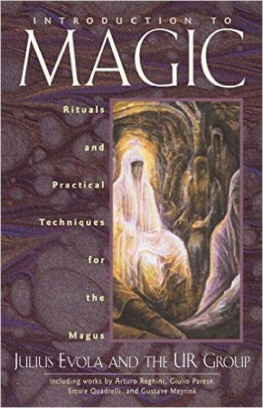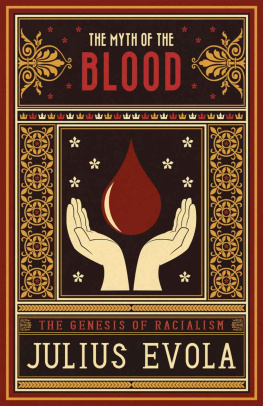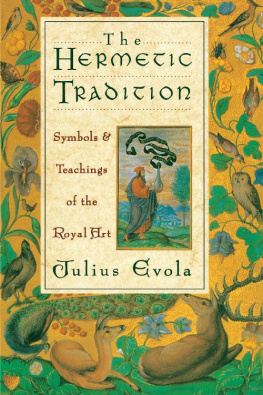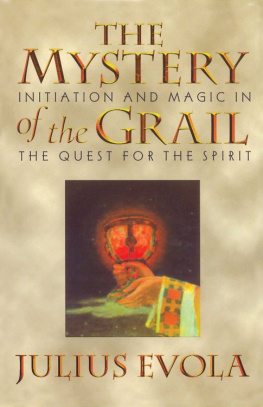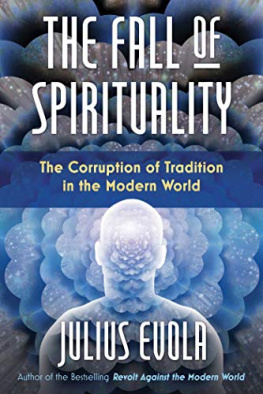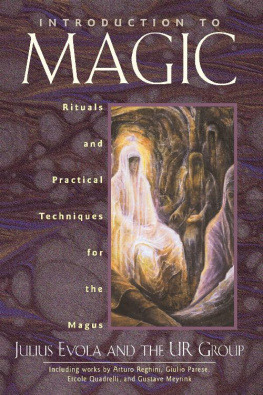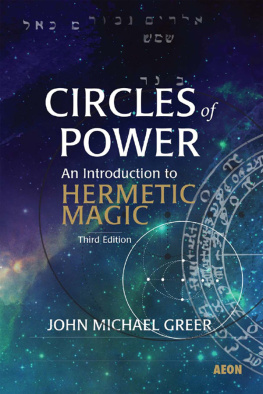Magic

Rituals and Practical Techniques for the Magus
JULIUS EVOLA and the UR Group
Translated by Guido Stucco Edited by Michael Moynihan
Inner Traditions Rochester, Vermont
Inner Traditions International One Park Street
Rochester, Vermont 05767 www. InnerTraditions. com
First U.S. edition published by Inner Traditions in 2001Originally published in Italian under the title
Introduzione alia Magia quale scienza dell'Io, Vol. by Edizioni MediterraneeRome, 1971Copyright 1971, 2001 by Edizioni MediterraneeRome English translation copyright 2001 by Inner Traditions International
All rights reserved. No part of this book may be reproduced or utilized in any form or by any means, electronic or mechanical, including photocopying, recording, or by any information storage and retrieval system, without permission in writing from the publisher.
Library of Congress Cataloging-in-Publication Data
Introduzione alia magia. Vol. 1. English.
Introduction to magic : rituals and practical techniques for the magus / Julius
Evola and the UR Group ; translated by Guido Stucco.1st U.S. ed. p. cm.
"Originally published in Italian under the title: Introduzione alia Magia, vol.
1... 1971."
ISBN 0-89281-624-4 (alk. paper)
1. Magic. I. Evola, Julius, 1898-1974. II. Gruppo di UR. III. Title.
BF1611 .158 2000 133.43dc2199-089368Printed and bound in the United States10 98765432 1Text design and layout by Priscilla BakerThis book was typeset in Berkeley with Abbess and Stone Sans as display faces.
Contents
Editor's Note ix Preface: Julius Evola and the UR Group by Renato Del Ponte xi Introduction 2
I
PIETRO NEGRI
Sub Specie Interioritatis 8
LEO Barriers 13
ABRAXAS Knowledge of the Waters 15 LUCE Opus Magicum: Concentration and Silence 21 EA The Nature of Initiatic Knowledge 26
II
The Path of Awakening According to Gustav Meyrink 34 LUCE
Opus Magicum: Fire 41
ABRAXAS Three Ways 46
LEO Attitudes 52
Commentaries on the Opus Magicum 55
III
LEO First Steps Toward the Experience of the "Subtle Body" 60 Knowledge as Liberation 64 ABRAXAS The Hermetic Caduceus and the Mirror 72 LUCE
Opus Magicum:The "Words of Power" and the Characters of Beings 79 PIETRO NEGRI Knowledge of the Symbol 83
IV
Apathanatismos: Mithraic Ritual of the Great Magical Papyrus of Paris 98
V
Summary 130
ABRAXAS Instructions for the "Awareness of Breath" 133 Oso Notes on the Logos 135
AROM First Experiences 141
EA The Problem of Immortality 144
VI
LEO Beyond the Threshold of Sleep 152
EA On the Magical View of Life 156 ABRAXAS The Second Preparation of the Hermetic Caduceus 160 IAGLA Experiences: The Law of Beings 167 The Path of Realization According to Buddha 173 Various Commentaries 181
VII
LUCE Instructions for Ceremonial Magic 186 EA The Doctrine of the "Immortal Body" 196 De Pharmaco Catholico 203
vm
ABRAXAS Magical Operationswith "Two Vessels"Reduplication 21 8 Tibetan Initiatic Teachings:The "Void" and the "Diamond-Thunderbolt" 22 8ARVO On the Counter-Initiation 23 5 LUCE
Opus Magicum: Perfumes 24 3
IX
ARVO Conscious ThoughtRelaxationSilence 25 2 EA Considerations on Magic and Its Powers 25 7 ABRAXAS Magic of the Image 26 6
PIETRO NEGRI An Italian Alchemical Text on Lead Tablets 27 3
X
LUCE Opus Magicum: Chains 29 6 LEO The Attitude Toward Initiatic Teaching 30 0 EA Freedom, Precognition, and the Relativity of Time 30 4 Commentary on the Opus Magicum 31 5
XI
IAGLA Serpentine Wisdom 31 8
LUCE Invocations 32 4
Excerpts from De My stems 32 9 The Message of the Polar Star 33 4 SIRIUS Mist and Symbols 33 5 EA On the General Doctrine of Mantras 33 8
XII
ALBA
De Naturae Sensu 34 8 LEO Aphorisms 35 7 PIETRO NEGRI Adventures and Misadventures in Magic Various Commentaries 36 8
Editors Note
Introduction to Magic is a complex book that presented numerous hurdles for both translator and editor. A primary example of this can be seen in the Italian title Introduzione alia Magia quale scienza dell'lo (literal translation: introduction to Magic as a Science of the I"). The fundamental theme of the book concerns the training and development of this "Io," a term for which it is difficult to find a suitable English equivalent. The word ego is not an appropriate choice, in part due to connotations from modern psychoanalysis. Use of the English first person "I" as an impersonal noun is awkward, and therefore the best solution was to utilize the term Self, capitalized as a proper noun.
Other obstacles in translation arose from the unusual nature of the book's contents. The contributors came from various backgrounds and their individual writing styles reflect this. It would be inappropriate to reduce them to one homogeneous prose; the reader will therefore notice inconsistencies among the authors and articles, especially with regard to unique preferences for capitalization, punctuation, and emphasis. We have generally left these idiosyncrasies intact, in order to convey accurately what the original readers of the journal Ur had in front of them.
When dealing with foreign documents (e.g., the Tantric and Buddhist texts, or the Mithraic Ritual) we have not referred to modern translations of these works, but instead have returned to sources closer to those texts that the UR Group used when preparing their own translations.
We have introduced some clarifications to aid the modern reader. Translations are given for most of the Latin words and phrases, and we have also provided transliterations of ancient Greek terms when this serves to illuminate the author's message (notably in the essay "Knowledge of the Symbol" by -Pietro Negri").
The footnotes throughout the book are either from the author of a given essav or. when indicated, by the UR Group as a whole (although, as Renato X
Editor's Note
Del Ponte points out in his preface, these notes were most likely written by Evola). We have provided some additional footnotes, which are always indicated as "Editor's notes." The precedent for some of these notes comes from the German edition of Introduction to Magic, edited and translated by Dr. H. T. Hansen, to whom we are indebted for allowing us to draw from his work. A grateful acknowledgment is also given to Joscelyn Godwin, who made an immense amount of contributions toward revising and refining the English translation of Introduction to Magic. The degree to which this edition reflects the subtleties of meaning originally invested into the material by the UR Group is largely due to his input.
A piece of advice offered by Dr. Hansen to German readers of the book is equally valid for the present edition: Although much effort has been expended in making this translation as clear as possible, we recommend that it be read using the "ears of the heart," for a certain freedom of the translation was unavoidable.
Preface
Julius Evola and the UR, Group
Renato Del PonteTh e collaboration that Julius Evola sought out at the end of the 1920s with the most interesting figures of Italian esotericism to form the famous UR Group, aside from the example it has provided and continues to provide to anyone seriously engaged in the esoteric sciences, is also extremely important in the overall context of Evola's work. For it was precisely during this period that he came to expand his own interests in the real, timehonored realms of Tradition, and at least two of his principal works,

